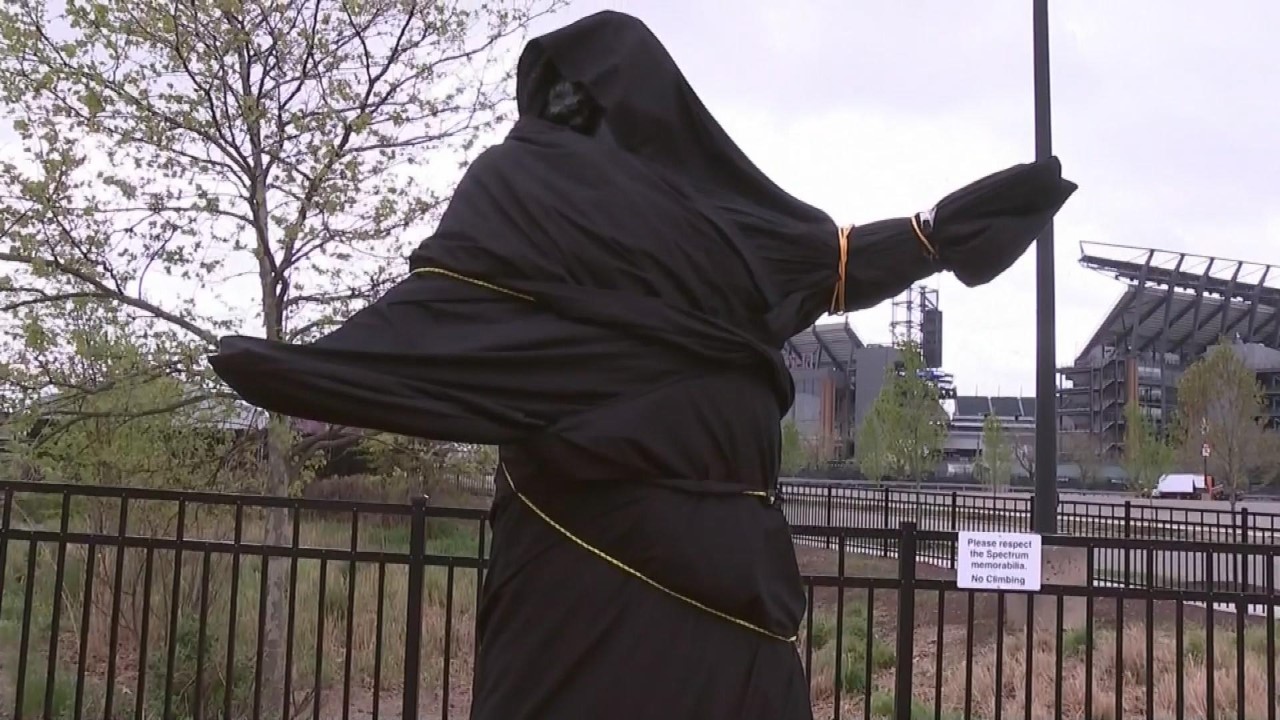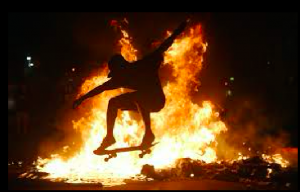Great philosophers can make great errors when they confront things that challenge their closely held beliefs. Theodore Adorno, a brilliant critic of classical music, wrote ignorant essays about pop and jazz. Noam Chomsky, whose work is fundamental to modern linguistics, has a naive grasp of how media operate. Michel Foucault, whose writing on discourses and authority shaped postmodern thought, regarded the Ayatollah Khomeini as a guide to liberation from Western materialism. And then there’s Judith Butler.
 Richard Goldstein
Richard Goldstein
From the River to the BBC: Carnage and Complexity in Gaza

CNN fired a photojournalist who was embraced by the leader of Hamas.
Like many Jews, I’ve read things about the bombing of Gaza, seen things on TV, and heard things shrieked in the streets that have horrified me in starkly contradictory ways. The truth about this awful sequence of events is as hard to come by as it is complex, but the slogans mask as much as they proclaim, and the coverage does something even more ominous: it simplifies. Every day I’m glued to my TV, gripped not just by the unbearable images that the carnage has produced, but also by the stimulation of my senses, the spectacle of mass death. It’s what I’d call visceral news, which compels me to watch, and it’s all true. But it’s not the truth. That requires context, which isn’t a visual.
The Tropes (Slight Return)
A slightly revised version of the author’s commentary in today’s First Respondents’ email…
Taking Bad Bunny Seriously

First, some facts about Bad Bunny, in case you think he’s a rowdy pet. He’s Billboard’s artist of the year and Spotify’s most-streamed artist for two years running—an amazing feat for someone who sings in Spanish. His reach is global, but his songs are local, rich with Puerto Rican slang. (I’ve heard him introduced as “Ba-Boney” on Spanish-language TV.) He looks like he was born in a baseball cap, but he sometimes performs in a dress. He chose his stage name because, as he told the late-night host James Cordon, “even when he’s bad, he’s cute.”
Dealing With Dave Chappelle
Saturday Night Live isn’t having a great season. A largely new cast lineup turned out to be a limp imitation of the golden years, and the ratings have plummeted. If SNL is to survive, it must recover its edginess, and one way of doing that is to prick liberal pieties. No comic has a better aim when it comes to this mission than the host of last week’s show, Dave Chappelle.
In the annals of black transgressive comedy, Chappelle is distinct. His best work is profoundly insightful, in keeping with the masters of this tradition, such as Richard Pryor, Eddie Murphy, Chris Rock, and Jerrod Carmichael. What makes Chappelle stand out in this storied company is his sadism.
Venturing Forth
Fantasy #1
Maskless. Finally. Now I look like everyone else on the street, because only old people wear masks around here. Lunch with friends I haven’t seen since the day the earth stood still. They’ve aged—but not me. The cautions and coverings haven’t changed my face at all. Like Broadway, I’m back.
The Myth of Joan Didion
Joan Didion’s death last week was followed by an outpouring of praise stretching over a week in The New York Times. This raises a critical question. Was Didion really a great writer, or merely the vector of attitudes held by the commenting class? The answer lies not just in her most famous books and essays, but in a piece she wrote that has been overlooked by those who present her as a seer into the enduring meaning of the past.
Didion has been cast as a prophet of the present who “told the truth about America,” as one Times writer gushed. Well, she did tell a kind of truth, one that many sophisticated readers wanted to hear after the traumas of the 60s. Apparently, they still want to hear it. Her images of crazed violence resonate, for her admirers, with the current threat posed by the violent right. But this selective view of Didion’s work ignores the evidence that her dystopian gaze was usually a reactionary one.
Nocturne for Washington Square

As a resident of Greenwich Village, my local park is Washington Square. I can’t account for what goes on there late at night. According to the media, there’s a riot going on after dark, with bottles being thrown at cops, brawls and even stabbings. There are those in the neighborhood who want to see a curfew in the park, as well as a skateboard ban and restrictions on how many people can be there. These Good Citizens are aiming at the one source of disturbance they can control: the young. But the atmosphere of frantic abandon is too widespread in the city to be controlled. Many people have emerged from lockdown with intense pent-up feelings, and challenges to the police make law enforcement a tricky task. Last week, a deranged man smashed the windows of my favorite diner and decked the 73-year-old cook. Hundreds of dirt bikes have roared up the avenue under my window at 1 a.m. Bursts of impromptu fireworks pierce the slats of my blinds, and I often hear cries of unleashed rage. In the wee hours, I don’t go out wearing flowers in my hair.
There’s a racial subtext to this issue, since the crowd in the Square includes many people of color, and they bring the culture of their neighborhoods, including music. Race and class have always been the flashpoint of disputes over urban turf, but in the streets of Greenwich Village the rules are lightly applied, even if the mixing doesn’t extend to the high-rent apartments. It’s no surprise that Washington Square is now a site of that diversity, since it has a storied history of free expression. The mood may be hard-edged after midnight, but at twilight, when the sunset is golden in the windows of innumerable buildings, it’s mellow yellow. I have seen no violence, but lots of casual toking and flirting—yes, there is plenty of cruising among people of all races, genders, sexualities, and hair colors that defy the human genome.
Tom Cotton Vs The New York Times; Queering the Debate
As the demand for “moral clarity” in journalism grows, at least among progressive journalists, I’m forced to reconsider my career as a censor, back when I was an editor at The Village Voice.
Alter Cocker
Even after this crisis is over, I will never stop feeling old. That’s what I’ve learned from the coronavirus. Old is not wise. Not just archaic. It is susceptible, assailable, penetrable—vulnerable.
Warren vs. Sanders: a Clash of Classes
Now comes Hillary Clinton, adding gravy to Elizabeth Warren’s beef with Bernie Sanders by suggesting that he has a pattern of disparaging female opponents. One of them, former Vermont governor Madelyn Kunin, says Sanders called himself a better feminist then she and “urged people not to vote for me just because I was a woman.” Ouch! On the other hand, NOW has a history of endorsing men over women who don’t support their issues, and Sanders’ record has been good enough to earn him a 100 percent rating from the group. So, should you cast your ballot on the basis of Clinton’s assertion? Four years ago, I did.
The Progressive Bubble
When is a fact not the truth? When it’s incomplete.
The Kate Smith Perplex

Omar and the Magic Jew
Is Ilhan Omar an anti-Semite? I don’t know. I can tell you that some of the things she’s written and said resonate with anti-Semitic tropes, and those who deny it should know that very well. But Omar may not have understood why images of Jews as disloyal, unjustly wealthy, or vested with magic powers that can “hypnotize the world” are bigoted. After all, she spent the formative years of her youth in Somalia, where such ideas linger below the surface of awareness.
None Dare Call it a Sex Scandal

Gilets Jaunes: The Turning Point
PARIS—As I write this, Emmanuel Macron is about to make a major speech addressing the protests that have disrupted his nation. He’s expected to show a new side of himself, more consultative than when he took office in 2017 and the press dubbed him President Jupiter. Now he’s more like a black hole, invisible yet immensely powerful, since his deputies control the Assembly. What will he say? Will he raise the minimum wage, as the protesters have demanded? (Unlikely.) Will he speak of dialogue with his “co-citizens?” (Very likely.) Will he stick to the reforms that have widened the gap between the rich and rest of France, or will he give just enough to satisfy a center that has yet to make its intentions felt? Stay tuned. But don’t expect the American media to convey the full significance of what has happened here over the past month. Our image of the French reflects an ancient Anglo-Saxon bias: They’re chic, but dangerous when they take to the streets. In fact, for all its uncertain and unsettling aspects, the uprising of the Gilets Jaunes offers a model of participatory democracy that we can learn from.

Brigitte Bardot En Marche
Attack of the Yellow Vests
Richard Goldstein filed this piece the day before the French government rolled back the proposed fuel tax increases that have sparked protests throughout the country.
The Bitch Whistle
The appointment of Brett Kavanaugh is a stark reminder of patriarchal power, but also a catalyst of militance and mobilization. Suburban women—the so-called soccer moms—are a major swing vote, and in the midterms their feelings about sexual harassment could be a decisive factor, at least when it comes to the House. But beneath the outrage and determination is a more complicated picture. To ignore it is to suffer the results.
Stormy’s Tale (Or: Protect Me From What I Want)
Extry! Extry! Read all about it. The president is a spanko.
